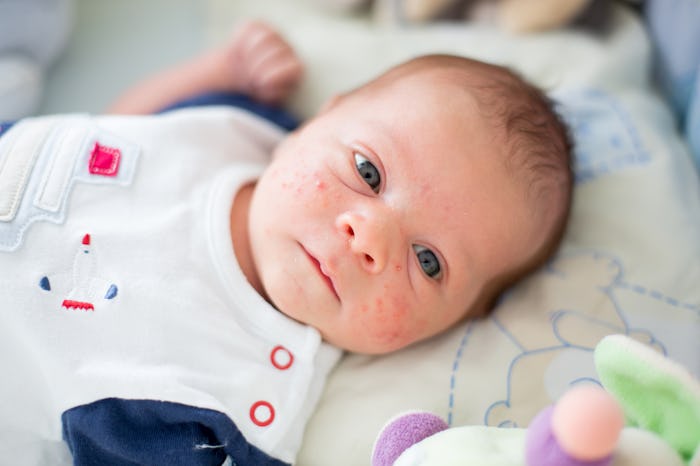Life

Here's What You Need To Know About Your Baby's Eczema & Allergic Reactions
My sister has had eczema for as long as I can remember, so it came as no surprise when my oldest son developed eczema as a baby. I knew all about the hereditary component of eczema, but I questioned if baby eczema is an allergic reaction. My son seemed super sensitive to any new bath products, changes in laundry detergent, and his skin couldn't tolerate anything scented, which contributed to my suspicion of an allergic reaction.
"Eczema can present as spots of dry, red, and flakey skin around the skin of an infant's body. The face and extremities are most commonly affected," Dr. Gretchen Frieling, a triple board-certified dermatopathologist practicing in Boston tells Romper. "While babies don’t have sharp nails to pick at their patches, the itchiness of the condition can cause them to feel discomfort and unrest."
This type of skin irritation can look like an allergic reaction to new parents, especially those unfamiliar with the condition. "Things that can irritate a child can result in eczema breakouts. But it is unclear whether allergies are the root of the condition," Frieling tells Romper. "If your infant has had visible signs of dermatitis, allergens like dander, dust, fragrances, certain types of fabrics, and food can add to the irritation. The initial cause of eczema is still unclear; however, we know that if a parent has the condition, the child is more likely to have it."
Although eczema in babies is not necessarily caused by an allergic reaction, it may be associated with the development of food or environmental allergies in some cases, The American College of Allergy, Asthma, and Immunology reported.
"Babies with eczema typically have an underlying genetic susceptibility to the condition. Their parents often have eczema, allergies, or asthma, and they can be at risk of developing allergies and asthma in the future," Dr. Scott Krugman, vice chair of the Department of Pediatrics at the Herman & Walter Samuelson Children’s Hospital at Sinai Hospital of Baltimore tells Romper. "Usually babies with eczema are not reacting to something in their environment other than dry air. Babies can get a rash similar in appearance to eczema called contact dermatitis if an irritating chemical in the environment (like harsh soaps or detergents) comes in contact with their skin."
One study of 600 babies in the UK published in The Journal of Investigative Dermatology investigated the occurrence of food allergies in exclusively breastfed babies. The researchers examined the relationship between eczema in babies and their propensity for food sensitivities and found that a breakdown of the skin barrier and the inflammation that exists with eczema could play a role in the development of food allergies. Although this does not mean that every baby with eczema will have a food allergy, it does provide data to support a link between the two.
"A small number of babies with eczema have an allergy to cow’s milk protein. If this is the case, then removing the protein can help the eczema. Additionally, as babies with eczema have a genetic susceptibility towards getting allergies, it is not uncommon to see babies with eczema develop allergic rhinitis (hay fever), asthma, or other food allergies when they are older. None of these occur because of the eczema, but because of the genetic predisposition."
In my son's case, this makes total sense. Now at age 7, his baby eczema has cleared, but his seasonal allergies are off the charts. Whether or not your baby is dealing with allergies alongside their eczema or not, there are numerous ways to keep the uncomfortable skin condition under control.
"First, consult with your doctor to rule out allergic reactions, psoriasis, and other conditions with overlapping symptoms," Frieling says. "With your doctor’s guidance, you can learn to manage the baby’s eczema efficiently by soothing the symptoms with lukewarm baths to alleviate the itchiness and following up with a moisturizer that is geared to be lightweight and supplement ceramide production in the skin. Low ceramide production is a common trait of people living with eczema."
Additional precautionary measures to help keep your baby safe and comfortable despite their eczema include avoiding tight clothing, using fragrance-free products, and helping your baby avoid scratching.
Studies Referenced:
Flohr, C., Perkin, M., Logan, K., Marrs, T., Radulovic, S., Campbell, L. E., … Lack, G. (2014). Atopic Dermatitis and Disease Severity Are the Main Risk Factors for Food Sensitization in Exclusively Breastfed Infants. Journal of Investigative Dermatology, 134(2), 345–350. doi: 10.1038/jid.2013.298
Experts:
Dr. Gretchen Frieling, Triple Board-Certified Dermatopathologist in the Boston-Area
Scott Krugman, MD, MS, FAAP, Vice Chair, Department of Pediatrics, Herman & Walter Samuelson Children’s Hospital at Sinai Hospital of Baltimore